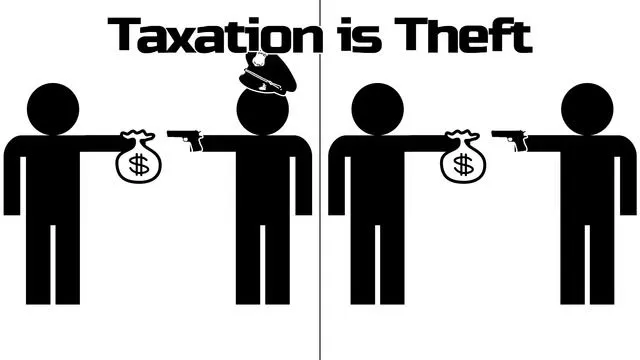
It is not right for one person to steal. It is not right for two people to steal. It is still not right for 51% of a voting population to vote for a representative who will hire a tax collector to steal for them. One of the great government lies is that theft can be moral when performed by enough people and called taxation. Theft is theft. Even if some of the money stolen is used for legitimate purposes, that doesn’t change the simple fact that taxation is theft.
Some politicians will try to make the case that taxation is voluntary, and in a warped sense, for some people, it is. If you believe that governments exist to serve the people, all your tax dollars are put to good use, and you pay your taxes enthusiastically, then you might be more susceptible to the lie that taxation isn’t theft. But even if you happen to be so lucky, and you feel that taxes are “the price you pay for a civilized society,” you are living in a civilized prison. The moment you decide that you don’t like what your tax dollars are spent on, either you are submitting to the coercion behind every tax law, or you are going to jail.
We can only meet our potential when all relations are voluntary and cooperative. Every relationship between a government and a citizen is involuntary. The amount of coercion actually applied is irrelevant to assessing the effect of the threat. When a tax is imposed on a population, it means a large chunk of the wealth is no longer allowed to serve the needs of the people who earned it, but rather the needs of government. Only when all the diversions of resources by taxation are taken into account can we begin to grasp the massive potential lost.
Governments use taxes not only to steal from us, but also to control our behavior. Generally, taxes are imposed to the greatest degree possible, taking as much as they can from whomever they can. But sometimes, governments can take more money from us overall if they take in a specific way intended to modify behavior. For example, if a government imposes a tax on an unpopular behavior, it can get people to see government as an effective way of stopping that behavior, while really using it as an excuse to steal from an unpopular group of people and boost its credibility.
One of the great lies of taxation is that it’s a way for the poor to band together to take back from the rich. This could be dressed up to avoid the language of theft as in, “Successful people show their gratitude to the society that helped them by paying more in taxes.” Some people even believe taxation is a way to take the power back from the super rich, corporations, and banks. The people who have the money to pull the strings of politicians have rigged the system so the net effect of taxation is always a tax on the poor. Some tax systems are actually set up to steal more from relatively rich people, and some unpopular or unconnected rich people end up at a disadvantage, but from their results, it is obvious that governments exist to transfer wealth from the poor to the rich.
Because people respond to incentives, targeted taxation has precise effects. When any product, service, or activity is taxed, it becomes more expensive and the market responds as it would to any price increase. This is true with the income tax, which allows some governments to take their victims’ money before they get control of it. But “hiding” a tax does not diminish its disastrous effects. It only makes collection more efficient. The incentive problem is not avoided, and when governments make any activity (like earning an income) less profitable, people will do it less.
Sales taxes are just as much theft as any other taxes, even though everyone chooses to pay them as they make consumer choices. A sales tax is simply conditional theft, just like import taxes or any other taxes on trade. While a consumer might have the choice of not buying something, a vendor has no choice but to build the cost of taxes into the price if they want to do business openly. Unfortunately for governments, taxation does nothing to diminish the black market. It encourages it.
The taxation racket has developed, evolved, and adapted to new circumstances and technologies. Widespread application and profitability ensure taxation techniques are always at the cutting edge. They have come a long way from the chief of a small tribe demanding tribute to the massive surveillance, investigation, seizure, and imprisonment operations of today. If the racket is not stopped soon, it will only get more invasive and destructive.
Taxation is an inescapable part of the government racket. If governments never stole, they would cease to be governments. If we could withdraw our financial support from them at any time, they would be voluntary cooperatives, or service providers. Because taxation is backed up with the threat of force, it is theft, plain and simple.
Chapter 5 Section I From FREEDOM! by Adam Kokesh

I am the author of FREEDOM!, a book endorsed (I mean banned) by the US Department of “Justice.” You can get a copy here. I’m running for Not-President in 2020 on the platform of the peaceful, orderly, and responsible dissolution of the United States federal government. You can find out more here. I am currently on my #TaxationIsTheft tour! You can find an event near you here. Whoever has the top comment on this post after 24 hours can claim a free signed copy of FREEDOM! by sending me a message with their address.